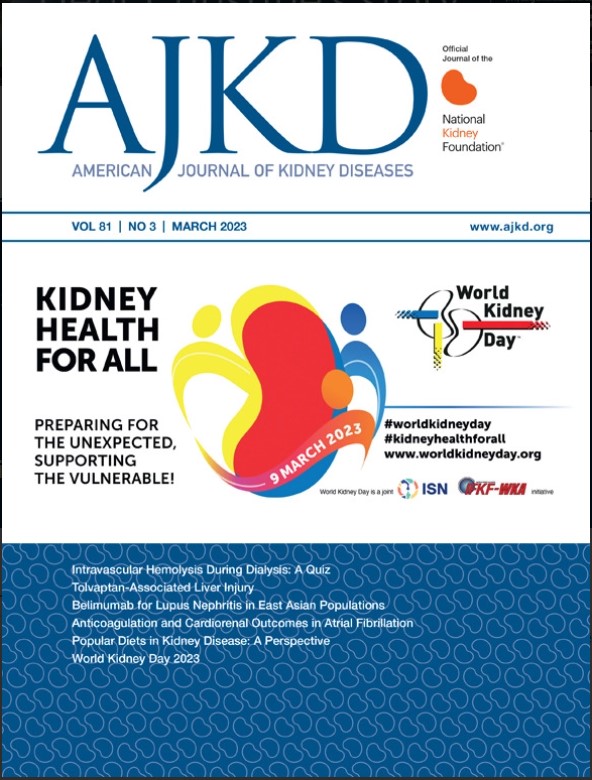年轻人理想心血管健康评分与心血管肾脏预后的关系
IF 8.2
1区 医学
Q1 UROLOGY & NEPHROLOGY
引用次数: 0
摘要
理由与目的:心血管疾病(CVD)与肾脏疾病之间的联系以及促进心血管健康(CVH)对预防心血管疾病的重要性日益得到认识。本研究调查了年轻人理想CVH及其纵向变化与心血管肾预后的关系。研究设计:回顾性队列研究。环境和参与者:从全国健康筛查数据中,我们确定了在2009-2010年接受基线健康检查的20-39岁无心血管疾病或肾脏疾病的成年人(N=3,836,626)。暴露:使用经过修改的美国心脏协会的生活简单7结构,排除饮食数据,参与者根据他们遇到的理想CVH评分组成部分的数量进行分类。在2011年至2014年期间接受随访健康检查的参与者(N=2,728,675)还通过基线和随访CVH评分的组合进行了分类。结局:心血管或肾脏事件的复合。心血管事件包括心肌梗死、缺血性卒中、心力衰竭和心血管疾病死亡。肾脏事件包括慢性肾脏疾病、肾脏替代治疗和肾脏疾病死亡。分析方法:原因特定比例风险模型。结果:在12.1年的中位随访期间,发生了134,317例心血管或肾脏复合事件。CVH评分越高,多变量调整后的事件风险逐渐降低(CVH评分为6比0:HR 0.32 [95% CI, 0.30-0.34])。CVH评分从基线(2009-2010年)到随访(2011-2014年)检查的增加与事件风险降低相关(每+1 CVH评分变化HR 0.86 [95% CI, 0.86-0.87])。此外,在基线和随访检查中保持高CVH评分的参与者的风险低于在随访检查中新获得高CVH评分的参与者(HR 0.87 [95% CI, 0.86-0.87] / +1基线CVH评分)。局限性:CVH评分不包括饮食数据。结论:在年轻人中,实现和维持高CVH与心血管-肾脏结局的风险降低相关。本文章由计算机程序翻译,如有差异,请以英文原文为准。
Association Between the Ideal Cardiovascular Health Score and Cardiovascular-Kidney Outcomes in Young Adults
Rationale & Objective
The linkage between cardiovascular disease (CVD) and kidney disease and the importance of promoting cardiovascular health (CVH) to prevent them are increasingly recognized. This study investigated the associations of ideal CVH and its longitudinal change with cardiovascular-kidney outcomes in young adults.
Study Design
Retrospective cohort study.
Setting & Participants
From nationwide health screening data, we identified adults aged 20-39 years without prior CVD or kidney disease who underwent baseline health examinations in 2009-2010 (N = 3,836,626).
Exposure
Using a modified American Heart Association Life’s Simple 7 construct excluding dietary data, the participants were categorized according to the number of ideal CVH components they met. Participants who underwent follow-up health examinations between 2011 and 2014 (N = 2,728,675) were additionally categorized by the combination of baseline and follow-up CVH scores.
Outcome
A composite of cardiovascular or kidney event. Cardiovascular events included myocardial infarction, ischemic stroke, heart failure, and death from CVD. Kidney events included incident chronic kidney disease, kidney replacement therapy, and death from kidney disease.
Analytical Approach
Cause-specific proportional hazards model.
Results
During a median follow-up of 12.1 years, 134,317 composite cardiovascular or kidney events occurred. Multivariable-adjusted risk of the event decreased stepwise with higher CVH scores (for a CVH score of 6 vs 0: HR, 0.32 [95% CI, 0.30-0.34]). An increase in CVH score from baseline (2009-2010) to follow-up (2011-2014) examination was associated with lower risk of the event (HR, 0.86 [95% CI, 0.86-0.87] per +1 CVH score change). Moreover, the risk was lower in participants who maintained high CVH scores at both baseline and follow-up examinations than in those who newly achieved a high CVH score at follow-up examination (HR, 0.87 [95% CI, 0.86-0.87] per +1 baseline CVH score).
Limitations
Diet data were not included in CVH score.
Conclusions
In young adults, achieving and maintaining high CVH was associated with reduced risk of cardiovascular-kidney outcomes.
Plain-Language Summary
Cardiovascular disease (CVD) and kidney disease are closely connected, influencing each other from an early age. We explored whether achieving and maintaining good cardiovascular health (CVH) in young adulthood was associated with the prevention of future CVD and kidney disease. Our findings showed that young adults with better CVH had a lower risk of developing these conditions later in life. Improving CVH over time led to reduced risk, and maintaining good CVH from the start was even more beneficial. These results highlight the importance of achieving and sustaining good CVH early in life to help prevent CVD and kidney disease over time.
求助全文
通过发布文献求助,成功后即可免费获取论文全文。
去求助
来源期刊

American Journal of Kidney Diseases
医学-泌尿学与肾脏学
CiteScore
20.40
自引率
2.30%
发文量
732
审稿时长
3-8 weeks
期刊介绍:
The American Journal of Kidney Diseases (AJKD), the National Kidney Foundation's official journal, is globally recognized for its leadership in clinical nephrology content. Monthly, AJKD publishes original investigations on kidney diseases, hypertension, dialysis therapies, and kidney transplantation. Rigorous peer-review, statistical scrutiny, and a structured format characterize the publication process. Each issue includes case reports unveiling new diseases and potential therapeutic strategies.
 求助内容:
求助内容: 应助结果提醒方式:
应助结果提醒方式:


